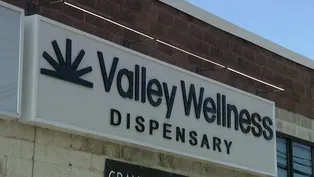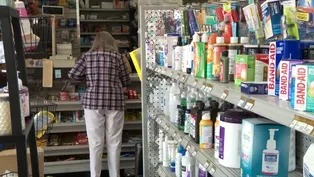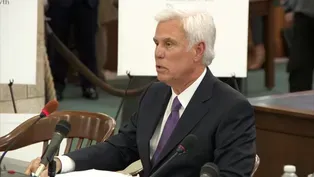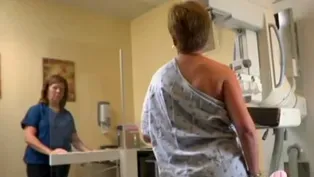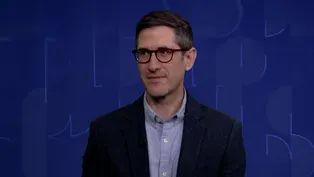NJ Spotlight News
NJ Spotlight News: May 10, 2023
5/10/2023 | 26m 46sVideo has Closed Captions
Watch as the NJ Spotlight News team breaks down today's top stories.
We bring you what's relevant and important in New Jersey news, along with our insight. Watch as the NJ Spotlight News team breaks down today's top stories.
Problems with Closed Captions? Closed Captioning Feedback
Problems with Closed Captions? Closed Captioning Feedback
NJ Spotlight News is a local public television program presented by THIRTEEN PBS
NJ Spotlight News
NJ Spotlight News: May 10, 2023
5/10/2023 | 26m 46sVideo has Closed Captions
We bring you what's relevant and important in New Jersey news, along with our insight. Watch as the NJ Spotlight News team breaks down today's top stories.
Problems with Closed Captions? Closed Captioning Feedback
How to Watch NJ Spotlight News
NJ Spotlight News is available to stream on pbs.org and the free PBS App, available on iPhone, Apple TV, Android TV, Android smartphones, Amazon Fire TV, Amazon Fire Tablet, Roku, Samsung Smart TV, and Vizio.
Providing Support for PBS.org
Learn Moreabout PBS online sponsorship>> tonight on New Jersey Spotlight News, no deal in sight regarding the ceiling debate.
Plus come open for business.
>> I learned what I could about being able to break into the industry.
>> The state's first independently owned recreational pot shop.
Also, new cancer screening guidelines.
They recommend mammograms begin as young as 40.
And South Jersey political power broker George not press is stepping back from politics, but will he really be out of the game?
NJ Spotlight News starts right now.
This is NJ Spotlight News.
>> Good evening and thanks for joining us.
The high-stakes standoff over the debt ceiling remains deadlock.
The meeting between Kevin Mark and Joe Biden ended with little to show.
Now just weeks away from the deadline for the U.S. to run out of money, potentially defaulting on its bills.
The president today making stops in New York as he assailed the Republicans for holding the economy hostage and calling for urgent action from Congress, making the case to raise the debt ceiling.
Republicans are holding firm, refusing to do so without significant spending cuts.
The two sides remain far apart have agreed to meet on Friday.
All of it could spell catastrophic consequences for the economy.
For more, I am joined by a budget and finance writer.
We were not expecting a breakthrough in these conversations between the president and the speaker of the house, but are we any closer to avoiding a default on the debt ceiling?
John: Really good question.
We do not probably know enough now.
Default is not a direction any of them want to land in.
If you read some of the analysis that has come out since the meeting, the optimistic take is that there were a few items the president said he might be considering.
One might be a way to avoid the limit if they do have an impasse.
Another would be to find ways to find compromise.
The debt ceiling is for spending limits already incurred by the federal budget.
The debt limit is for past spending.
The budget talks would be for future spending.
Maybe we saw areas where there is potential compromise, but they did not come out arm in arm.
Briana: When you have the Treasury Secretary Janet Yellen saying there are no good options if we cannot pay our bills, how concerned are state leaders?
What have you gathered there as far as what the impasse can be?
>> I think they are just starting to realize this.
An impasse and a default would be dramatic for the state because the budget forecast already looks far into the future under difficult circumstances as we think about the potential for recession, the inflation, that below make things difficult in the normal setting.
You throw in the wildcard of a possible default and all the havoc it would become the federal government, it would cascade down to the state level.
It is getting late in the game a lot earlier because of this.
There is a big hearing next week in Trenton on the budget.
Briana: The state has been given in recent years different types of federal money, quite a bit of funding from the government.
Is there a potential for clawbacks?
John: Yes, and that was one of the really big things if you were listening closely.
Maybe that is an area of compromise.
We do not know any real details, but one ria -- area is if the president would be willing to clawbacks some of the COVID-19 federal aid.
Of the funding that has been allocated, not all of it has been spent.
That is something to keep a close eye on.
Briana: Thank you so much.
The first nonprescription birth control pill could soon be available in the United States.
Advisors to the Food and Drug Administration recommended approval for the over the counter medication Opill.
It would greatly expand access to contraception in a post Roe v. Wade world.
Here in New Jersey lawmakers have made it easier for people to access reproductive health care.
Experts say an over-the-counter birth control pill would remove a key barrier.
Her senior correspondent reports.
Reporter: Dr. Maria Sophocles cheered a unanimous vote to make Opill the first birth control pill available without a prescription.
It would let shoppers pick the medication off of a store shelf.
Dr. Sophocles says it would strike down so many barriers.
>> I have seen firsthand how hard it is for some women to get to my office.
And then there is the co-pay and this will eliminate all of that.
>> I think this represents a landmark in the history of women's health.
Unplanned pregnancies can really derail a woman's life.
Reporter: Advisors believed the medication is safe and effective.
15% of women may miss three or more doses at least one per month.
Opill should be taken daily within the three -- the same three hour window.
>> This is among the safe this -- safest of the contraceptive products.
>> We can take this opportunity to increase access, reduce disparities.
I vote yes.
>> There is so much testimony from doctors, pharmacists, young people at all said there is such a big need.
Reporter: The panel discussed the label instructions and decided people would understand them.
>> even with the limitations, it is reassuring that this safe medication can be used by all ages, particularly adolescents and those with limited literacy.
I see no reason to single them out to not have available.
Reporter: In the wake of the Supreme Court's decision to overturn Roe v. Wade, an over-the-counter pole would open a pathway.
Making birth control over-the-counter could prevent 37,000 pregnancies a year.
>> Because of the decisions coming from the court and state legislatures we need to make sure women have access to birth control.
Reporter: Governor Murphy signed a bill that would make all birth control medications and devices available without a prescription.
But patients would need to see a pharmacist.
>> And go through a very simple assessment, making sure the medication is appropriate for the specific individual.
Reporter: The FDA also complained about the data.
>> They have been put in a difficult position of trying to determine whether it is likely that women will use this product safely and effectively in nonprescription settings.
The FDA does recognize how important women's health is.
Reporter: The agency is not expected to vote until the summer.
Briana: If you are 40 years or older, it is time for a mammogram.
New guidelines from the U.S. preventative services task force recommend breast cancer screenings every other year, starting at age 40.
The government panel says lowering the age could save 19% more lives, especially for black women who are 40% more likely to die of breast cancer.
It is the second leading cause of cancer death among women in the United States.
For more of new recommendations, I am joined by Dr. Harriet Borofsky.
For years, we sought advocacy groups, clinicians as well, calling for a lower age recommendation.
Why are we seeing this now?
>> We are so encouraged and a little bit relieved.
We are seeing these recommendations now because for many years the United States preventative task force was not advocating for routine screenings of women in their 40's.
Those of us that live and breathe early detection screening have known for many years.
Women in their 40's account for a significant proportion of breast cancer's.
They tend to get more aggressive tumors.
We are seeing an increase in early age breast cancer's for reasons that are uncertain.
Women in their 40's account for at least 20% of all women who have had breast cancer and most of them are not women who have a family history or other risk factors.
Why we are seeing an increase, we are uncertain about.
Briana: What does our recommendation mean?
Will insurance companies be required to pick up the cost of this?
If I or anyone else goes in and we meet D.H. requirements and request mammogram will we be given one automatically?
>> Recommendation is really a guideline.
It is a way for your doctors to counsel you and it is a way for women to know when to start screaming.
These are guidelines for us.
In terms of insurance, insurance companies are covering women including women in their 40's for having screening mammograms.
The guidelines are different among different governing bodies.
We have been recommending and advocating screening mammograms starting at the age of 40 based on the recommendations of the American College of radiation.
Briana: Are there any risks associated with having more frequent scans?
>> The benefit far outweigh any risks.
The only risks cited were the anxiety and stress related to recalls for mammograms.
We had to do biopsies in order to diagnose breast cancer.
Many biopsies are benign.
I think the greater harm is not screening young women, particularly women in their 40's.
Any risk from radiation is incredibly low.
Briana: Dr. Harriet Borofsky is from Hackensack Meridian health.
Thank you so much.
Gas prices may be falling, but drivers should brace for another toll hike on the way.
Told will increase on the Garden State part where and Turnpike beginning in 2024.
It will be the fourth toll hike since March 2020.
The announcement came during a Senate budget committee hearing Thursday but officials declined to say how much extra drivers will be paying.
Toll increases have been determined using the process known as indexing, which ties the rate hike to an economic indicator and does not require public hearings.
There is tax relief on the way for the states expanding legal cannabis industry.
Governor Murphy signed a law given license marijuana businesses the ability to deduct certain expenses under state tax returns just by decoupling them from federal rules.
It is a workaround on an IRS code.
Marijuana still classified as a narcotic schedule one of the federal level.
They take into account the normal operating cost to do business here.
The law comes as the state marks to other big firsts this week.
The opening of two more recreational cannabis shops, both owned by women, server and a growing field of customers at a time when the number of New Jersey's medical patients is dropping.
>> We finally having this moment is the culmination of years and years of hard work and patience.
Reporter: It is a process she started in 2018.
Now her business, family wellness of Raritan, is the first woman owned dispensary in New Jersey.
>> We were the first standalone to open in the state for medical sales in late 2022.
Last week, we open for recreational sales.
Reporter: Suzanne Nicholson also celebrating a big win.
Holistic solutions dispensaries the first black woman owned shop.
>> We are so honored to be one of the first minority owned operators.
We are five days in, so it is a fluid opportunity of learning.
Reporter: As more dispensaries move into the recreational markets, the state is seeing a drop in medical marijuana patients.
High prices are one issue.
Cost could be lower if New Jerseyans are allowed to grow their own marijuana.
>> I would not be complaining if I could grow a little bit of my own every summer.
But with that prohibited and expensive prices, consumers are in a real bind in New Jersey.
In the dispensary it is $400 a $500 per ounce.
Reporter: Cannabis advocates say another issue for medical patients is the required doctors visit which is not covered by insurance.
>> The problem is the card has to be renewed every couple of years and you have to be recertified by these doctors.
Depending on the doctor, it could be every couple of months or once a year.
Reporter: The state still has a strong medical marijuana program according to Jeff Brown.
>> We still have 10,000 patients being served.
We have seen a 20,000 patient decline, but we still see strong sales.
Reporter: He says medicinal sales brought in $50 million as of the last quarter.
He says there are still significant benefits of being in the medical program.
>> The sales tax has been eliminated on medicinal cannabis.
Patients pay no tax on their cannabis.
We have reduced patient registration fees.
A patient will pay $50 every two years to sign up.
Reporter: They are continually working to make sure medical cannabis patients are prioritized as recreational sales expand.
Advocates hope the state will do more to make sure the market is affordable for everyone.
Briana: The latest inflation data out today from April shows consumer prices remain high.
4.9% greater than a year ago.
But better-than-expected.
Here is how Wall Street reacted today.
>> Support for The Business Report provided by the Chamber of Commerce Southern New Jersey, working for economic prosperity by uniting business and community leaders for 150 years.
Briana: A longtime South Jersey political boss, George Norcross, says he is stepping back from politics after a disastrous 2021 election season that tossed his ally Steve Sweeney to the sidelines.
He says his nearly three decade run is over.
Or is it?
David Cruz reports.
Reporter: We probably should have seen it coming and some probably dead, but George Norcross was already losing a step one Amy Kennedy who was backed by George Norcross.
But most people point to this.
>> The results of Tuesday's election are in.
I accept the results.
Reporter: Senate President Steve Sweeney, boyhood friend and political party, conceding to the MAGA adjacent trucker.
>> His affiliates that he collaborated with in Essex County and Bergen County, all of those political affiliates of the Norcross South Jersey machine lost their great color.
Reporter: When Norcross told politico that he was stepping back from political involvement, the political world paid attention.
She does not hold any public office.
-- he does not hold any public office.
>> She is an enormous insurance broker.
He works for public entities across the state and he kept those contracts by virtue of the people he helped put in office.
Reporter: During the Chris Christie days, they swung their axes all over New Jersey.
Often with Camden as the beneficiary, but Norcross has plenty of detractors in the city, like longtime resident Keith Benson, president of the Camden teachers union, who says Norcross is interest in the city was not all altruistic.
>> George Norcross has been immensely problematic to the regular folks here.
Reporter: A lot of what has transpired over the past decade here has been benefiting Norcross and his affiliated companies, especially some state-funded tax breaks.
Just how much and whether that will happen within the law is now the subject of a formal investigation by the state attorney general.
Norcross has denied that he benefited illegally, but is the timing related?
>> this follows in close proximity to the subpoenas.
Is there significance that he told prosecutors I am getting out and you do not have to worry about me anymore?
Reporter: Right now, George Norcross, Florida resident, says let the next generation take over the diminished South Jersey party.
>> Whatever that means, time will tell.
In a lot of ways, the damage has already been done.
Reporter: Norcross would not comment on his statements to Pol itico.
Stepping back remains in the eye of the beholder.
Here is an invite for a fundraiser Norcross held for his brother the congressman during the same week he said he is stepping back from politics.
In New Jersey, old habits die hard.
Briana: Make sure you tune in to Chat Box tomorrow night.
David Cruz looks at the state of New Jersey politics for women.
What will it take to make the state health more inclusive?
Bettis Thursday at 6:30 p.m. -- that is Thursday at 6:30 p.m.. Join a panel of experts as they discuss black maternal health in New Jersey with a look at existing disparities.
That is tomorrow at 4:00 p.m. Register online.
A reminder, you can now listen to NJ Spotlight News anytime through podcast wherever you stream.
Make sure you download it.
That will do it for us tonight.
Thanks for being with us.
We will see you back here tomorrow.
Demand for medical marijuana drops as recreational sale grow
Video has Closed Captions
Clip: 5/10/2023 | 5m | High product prices are one major issue (5m)
FDA panel green-lights OTC birth control pill
Video has Closed Captions
Clip: 5/10/2023 | 4m 28s | The agency isn’t expected to vote on Opill until end of this summer (4m 28s)
Garden State Parkway and Turnpike tolls will go up in 2024
Video has Closed Captions
Clip: 5/10/2023 | 1m 13s | Officials declined to say how much more drivers will be paying (1m 13s)
George Norcross is stepping back from political involvement
Video has Closed Captions
Clip: 5/10/2023 | 4m 46s | Norcross says let the next generation take over the now-diminished South Jersey party (4m 46s)
Panel recommends women get regular mammograms at age 40
Video has Closed Captions
Clip: 5/10/2023 | 4m 24s | Interview: Dr. Harriet Borofsky, breast radiology specialist at Hackensack Meridian Health (4m 24s)
State lawmakers brace for possible national default
Video has Closed Captions
Clip: 5/10/2023 | 4m 16s | The uncertainty is trickling down into state politics (4m 16s)
Providing Support for PBS.org
Learn Moreabout PBS online sponsorshipSupport for PBS provided by:
NJ Spotlight News is a local public television program presented by THIRTEEN PBS
